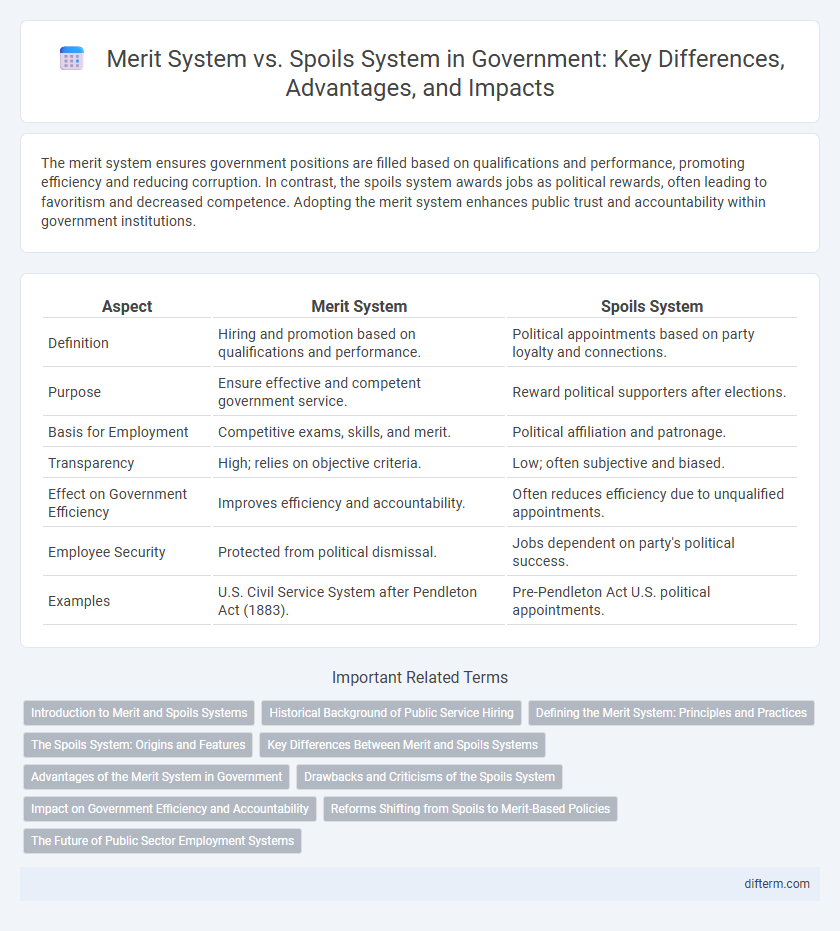The merit system ensures government positions are filled based on qualifications and performance, promoting efficiency and reducing corruption. In contrast, the spoils system awards jobs as political rewards, often leading to favoritism and decreased competence. Adopting the merit system enhances public trust and accountability within government institutions.
Table of Comparison
| Aspect | Merit System | Spoils System |
|---|---|---|
| Definition | Hiring and promotion based on qualifications and performance. | Political appointments based on party loyalty and connections. |
| Purpose | Ensure effective and competent government service. | Reward political supporters after elections. |
| Basis for Employment | Competitive exams, skills, and merit. | Political affiliation and patronage. |
| Transparency | High; relies on objective criteria. | Low; often subjective and biased. |
| Effect on Government Efficiency | Improves efficiency and accountability. | Often reduces efficiency due to unqualified appointments. |
| Employee Security | Protected from political dismissal. | Jobs dependent on party's political success. |
| Examples | U.S. Civil Service System after Pendleton Act (1883). | Pre-Pendleton Act U.S. political appointments. |
Introduction to Merit and Spoils Systems
The merit system and spoils system represent two contrasting approaches to government hiring and appointments. The merit system emphasizes selection and promotion based on qualifications, skills, and performance, ensuring a professional and efficient public service. In contrast, the spoils system allocates government jobs as political rewards, often prioritizing loyalty over competence.
Historical Background of Public Service Hiring
The merit system in public service hiring emerged in the late 19th century as a response to the corruption and inefficiency associated with the spoils system, which awarded government jobs based on political loyalty rather than qualifications. The Pendleton Civil Service Reform Act of 1883 marked a pivotal shift by establishing competitive exams and protecting merit-based appointments from political influence. As a result, the merit system promoted professionalism and accountability in government positions, contrasting sharply with the patronage-driven spoils system that dominated earlier U.S. political appointments.
Defining the Merit System: Principles and Practices
The merit system in government emphasizes hiring and promotion based on qualifications, skills, and performance rather than political connections. It establishes objective criteria such as competitive examinations and performance evaluations to ensure fairness and competency in public service. This practice fosters efficiency, accountability, and professionalism, minimizing patronage and corruption in government employment.
The Spoils System: Origins and Features
The Spoils System originated in the early 19th century United States, notably popularized by President Andrew Jackson's administration, which emphasized rewarding political supporters with government positions. This system is characterized by patronage appointments, where loyalty and party affiliation supersede qualifications or merit in hiring decisions. The inherent features fostered political loyalty but often led to inefficiency, corruption, and a lack of professional expertise in public service.
Key Differences Between Merit and Spoils Systems
The merit system emphasizes hiring and promoting government employees based on qualifications, skills, and performance, ensuring a professional and efficient public service. In contrast, the spoils system awards government jobs as political rewards to supporters and allies, often prioritizing loyalty over competence. Key differences include merit-based competitive examinations versus politically motivated appointments, promoting accountability and stability against patronage and frequent turnover.
Advantages of the Merit System in Government
The Merit System in government enhances efficiency by promoting qualified individuals based on skills and performance rather than political connections, ensuring competent public service delivery. It reduces corruption and favoritism, fostering transparency and accountability within government agencies. Implementing merit-based hiring improves employee morale and stability, which contributes to effective policy implementation and consistent administrative operations.
Drawbacks and Criticisms of the Spoils System
The spoils system often results in inefficient government operations due to the appointment of individuals based on political loyalty rather than merit or qualifications. This practice fosters corruption and patronage, undermining public trust and leading to frequent turnover that disrupts continuity in public administration. Critics argue it compromises the quality of governance and impedes long-term policy implementation.
Impact on Government Efficiency and Accountability
Merit systems enhance government efficiency and accountability by promoting hiring based on qualifications and performance, reducing corruption, and fostering a professional workforce. Spoils systems often lead to inefficiency and decreased accountability due to patronage, favoritism, and politically motivated appointments that undermine merit-based standards. Consequently, merit systems support transparent governance and consistent service delivery, while spoils systems weaken institutional integrity and public trust.
Reforms Shifting from Spoils to Merit-Based Policies
Reforms shifting from the spoils system to merit-based policies have enhanced government efficiency by promoting qualified candidates through competitive examinations and performance evaluations. The Pendleton Civil Service Reform Act of 1883 marked a pivotal change by reducing patronage appointments and establishing professional standards for federal employment. This transition has strengthened accountability and minimized corruption, fostering a more competent and impartial public service workforce.
The Future of Public Sector Employment Systems
The future of public sector employment systems is increasingly favoring merit-based frameworks due to their emphasis on qualifications, transparency, and accountability, which enhance governmental efficiency and public trust. Emerging technologies like AI-driven recruitment tools are expected to further reduce bias and improve selection processes within merit systems. Conversely, reliance on spoils systems risks undermining professionalism and institutional integrity, making merit-based systems indispensable for adaptive and ethical governance in the evolving public sector landscape.
Merit system vs Spoils system Infographic

 difterm.com
difterm.com